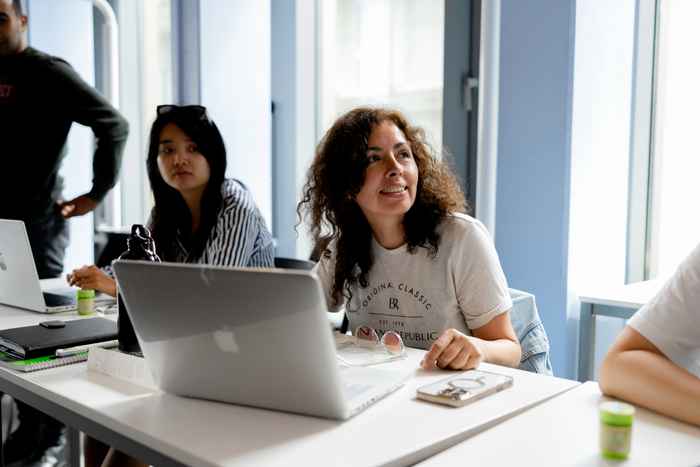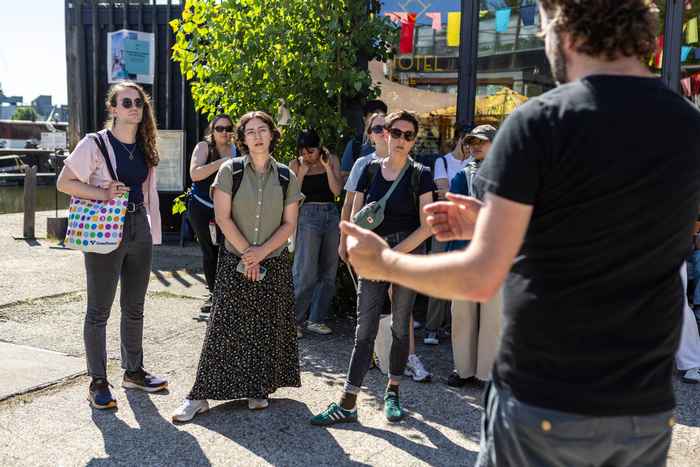Summer Institute on Sexuality, Culture and Society
The Summer Institute on Sexuality, Culture and Society, founded in 1997, is an unforgettable learning experience to be shared with a group of international students and taught by a multidisciplinary faculty. Participants benefit from an exceptional networking opportunity through the sharing of experiences, research plans and diverse perspectives with both professors and fellow students from a range of social and cultural backgrounds. The Summer Institute is a unique opportunity to study sexuality in all its diversities and is the only one of its kind in the world. The institute consists of three courses that can be taken separately or combined and stretched over seven weeks.
Note: This programme is divided into three parts. Applicants have the opportunity to apply for the Summer Institute in its entirety or one of the three parts. Please state clearly at the top of your motivation letter which part you are applying for. Please read the information in each foldout section carefully to determine your eligibility for this programme.
-
Eligibility requirements
Part 1
minimum second or third year Bachelor with (preferably) a background in social sciences and an expressed interest in sexuality studies. Master students and professionals will also be accepted if they can show a substantiated interest in sexuality studies.Part 2 and Part 3:
a minimum of 6 EC in sexuality studies, Masters, early-stage PhD, working professionals, community advocate/activists.
If you are unsure about your eligibility for this programme or have admissions related questions, please contact the Summer Programmes Office by emailing summer-info-gsss@uva.nl. -
Part 1: An interdisciplinary focus on theories and political debates in sexuality
Part 1 takes three weeks and provides an excellent interdisciplinary overview to the important theoretical and political debates around sexuality. Attention will be given to the ways in which sexuality has been conceptualized in past and current theoretical frameworks and to the growing movement which advocates for sexual empowerment and sexual rights. In the first week the students will be introduced to different theoretical perspectives in the study of sexuality, namely social constructionism, sexology, queer theory and postcolonial theory. In the second week we will discuss the concept of sexual stigma, and explore the sex industry in all its diversities. As Amsterdam has the reputation of being exceptionally liberal in matters of sexuality, we will visit different sexual spaces in the city and critically reflect on the notion of sexual freedom. These visits will enable us to reintegrate bodily sensations and embodied experiences in the theorization of sexuality and reflect on the body as a site of pleasure and of knowledge production. In the last week we will use the knowledge acquired thus far to craft a sex education program and get a better understanding of how sexuality intersects with other identities and power structures on basis of race, migrant status or social class in order to produce different forms of social inequalities.
Students will be equipped with the analytical tools to study these themes critically and reflexively. This programme is an ideal opportunity for scholars in the field of sexuality and gender to connect to peers.
-
Part 2: Practicing Sexuality Studies in a Changing World
This part consists of four modules. First we will examine the history of sexuality studies as an emerging discipline in the 19th Century, tracing its developments from essentialism to social constructionism. Module 2 will focus on sexual politics in the Netherlands, focusing on the feminist debate on sex work and the tensions between sexual pleasure and sexual abuse, and gay politics and how this promote new kinds of nationalism hostile to ethnic and religious minorities. In the second week for modules 3 and 4, we will take a deep dive into sex education and we will look how sexuality and gender play a key role in political mobilizations.
Module 1: Sexuality, Culture, and Society: An Overview of the Field - Marie-Louise Janssen
Module 2: Sexual Politics in the Netherlands
Module 3: Comprehensive Sexuality Education - Doortje Braeken
Module 4: The Sex and Gender Wars - Paul Mepschen -
Part 3: Critical Reflections on Advanced Topics in Sexuality Studies
In part three we dive deeper into a variety of evolving and current developments in sexuality studies over four modules. Contemporary conversations about sexual cultures and sex education frequently incorporate messages about the importance of consent. As we learn more about and critique models of consent it brings into question processes of formal and procedural consent. We will develop a critical understanding of how to navigate and create more opportunities for meaningful consent in different contexts. In the second module we will look into the connections between human rights, social justice, identity, and culture. How have western categories and global inequalities constructed the discourse on human rights and social justice? The next module will address the relation between divers (world) religions and sexuality, and will be presented by several scholars. Finally we will delve into the questions of why and how sexual pleasure has often been neglected in academic research, how this relates to larger social forces, and what steps we can take to rectify this.
Module 5: Rethinking Consent - Justin Hancock
Module 6: Sexuality, Human Rights and Social Justice - Silke Heuman
Module 7: Sexuality and Religion - Amish Bakuri and Brennan Kettelle
Module 8: "That feels good, do it again!” - Peter Miller -
Academic Directors
Part 1 & 2
Dr. Marie-Louise Janssen is a Cultural Anthropologist and senior lecturer in gender and sexuality studies at the Department of Sociology at the University of Amsterdam. She is one of the Academic Directors of the summerschool ‘Introduction to Sexuality Studies’, as well as a module coordinator in the ‘Summer Institute on Sexuality, Culture and Society’. Marie-Louise Janssen has published extensively on sex work, migration and human trafficking and lectures in the areas of gender and sexuality studies, migration and human trafficking and ethnographic research methods and techniques at the department of Sociology of the University of Amsterdam. Her current research interests include, among others, Chinese massage parlours in the Netherlands, student sex workers and currently sex work in the former Dutch colony of Curacao in the Caribbean region.Part 1
Eddy Chouity (MSc) is a junior lecturer at the bachelor and pre-master sociology program at the University of Amsterdam and is the Associate Academic Director of Introduction to Sexuality Studies. In 2017, he graduated from the University of Amsterdam with a master of science in social sciences from the gender and sexuality track. His dissertation handled the situation of Arab LGBTQI refugees coming from the Middle East and North Africa to the Netherlands. His interest lies at the heart of gender theories and sexualities and his ambition is to pursue a further in-depth exploration of sexuality, with a particular attention to the Arab world.Part 3
Dr. Peter S Miller is a social anthropologist, ethnographer and educator specialised in the fields of Gender, Sexuality, Anthropology, Queer African Studies and Qualitative Methods. They have taught and lectured extensively at the University of Amsterdam on the subjects of gender, sexuality and qualitative methods, and were awarded their PhD in 2024 for their thesis entitled "In the Shadows of Respectability: Gendered Trajectories of Marital Dissidence amongst Dakarois Professionals". They hold a particular research interest in queerying normative structures and ideas, decolonial theories, and the empirical study of gender and sexuality, with a current focus on the intersectionality of sexual pleasure. -
Additional Programme Information
During this programme, participants build on their existing knowledge of sexuality as it intertwines with issues of ethnicity, nationality, class, and religion, deepening their familiarity with how sexuality is conceptualized.
The open atmosphere and small scale of the classroom offers a unique setting for engagement and discussion of sexuality, culture and society. If you would like to broaden your knowledge with other professionals, graduate- and PhD-students, we invite you to apply through the link on the how to apply page.
-
Explore our community
Want to get to know more about studying in Amsterdam? Follow us on social media and join our summer community. Get a feel for our summer school vibe and our academic and social community, and learn about studying with us through the eyes of past summer school students.
Instagram | Facebook | LinkedIn | Twitter
Interested in hearing an alumni perspective? Read this interview with Stefan Lucke who attended the Summer Institute in 2011, and used his knowledge gained in Amsterdam to springboard into a PhD position, and undertaking important research. You can also read this alumni portrait with Farah Barakat, who joined the programme as an MSP Scholarship winner in 2018.



- Mode
- Short-term
- Credits
- 10 ECTS, 5 weeks
- Language of instruction
- English
- Starts in
- July